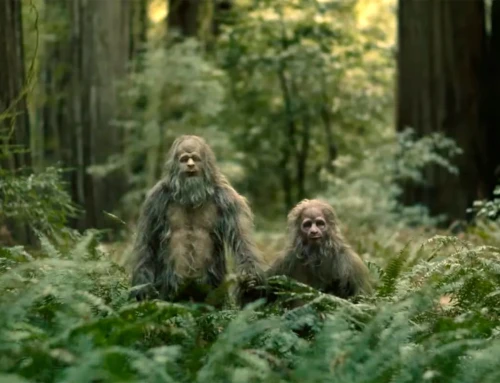“Monos”, the latest South American movie to come out of Columbia is an austere, deeply abstract, and equally frustrating film that gives no answers, or barely any clarity for its themes or ideas. All that is left is a bewildering hallow film riff of “The Lord of the Flies”, at once distinctive and beautifully shot, suddenly gets stripped away from any true meaning in its subject matter.
Shot with sweeping landscape cinematography by Jasper Wolf and directed by Colombian newcomer Alejandro Landes follows a group of young militant fighters, who are either training, or preparing for battle? The young soldiers seem to range in age from pre-adolescence/late childhood to late teens. We are introduced to the soldiers that reside high on a Colombian mountainside that consists of fog, dew, rain, and layers of clouds that reside just below them.
We are given no details how these teens are armed, what they are fighting for, who they’re working for, why they are holding an American doctor captive (Julianne Nicholson), and what their main objective is. What we get is a perplexing experience with a numbing style, that only gives muddled observation on the dynamics the soldiers and young comrades have for each other. We never know if these young soldiers are confined against their will, or if they are enslaved, or if they are rebels.
Very much in the vein of Bertrand Bonello’s, far superior “Nocturama” (A film that made my top 10 list in 2017), that also studied young terrorists invading a shopping mall, Bonello also gave no real answers or clarity in their motivations, yet Bonello delivered enough substance around the edges and meat on the bone in preventing it from feeling too evasive.
These young soldiers are all given names that are clearly nick names like Lobo (Julian Giraldo), Leidi (Karen Quintero), Boom Boom (Sneider Castro), and Rambo (Sofia Beunaventura), and they are only referred to as the “Organization”, and they only taker orders from a midget colonel named Mensajero (Wilson Salazar), or an unseen messenger that gives orders through an interceptor. Mansajero arrives earlier film, giving orders, and tormenting the young soldiers into shape with brutal exercises that is clearly influenced by Claire Denis’s “Beau Travail”. During the course of the film the young band of soldiers are just too young to take orders and are negligent.
Even if it means killing a cow they were supposed to watch over, and only use for its milk as if it was something sacred. A direct metaphor that shows their purity being corrupted as their savagery begins to unwind upon the killing of the cow. From there on the film sets up the same ideas from the metaphor, but we aren’t given a too much of an understanding of the politics, nature, or background of what is going on in the outside world.
From there the film sets up a thematic and visual rhythm that is surely a suave looking film, the landscape photography in the film holds the beauty of a Werner Herzog film, with the camera work that echoes Terrence Malick/Emmanuel Lubezki that also holds sudden bursts of kinetic cuts and shots, with a brooding sound design of the young soldiers enduring the chaos that erupts within them.
There are hints of Landos exploring the primitive nature that is repressed, or rather generated within adolescence. There is also some ideas about sexuality, both pan or bi-sexuality, and to an extent identity among the young soldiers, but it all feels removed and bundled together with half-baked and muddled ideas that never see fruition into any real deep interpretations. All dramatic elements and conflicts that appear in “Monos” are all for formal and stylized aesthetic pondering with some possible left-wing posturing about the current attitudes of Columbia’s paramilitary history of resisting Marxist-Lenist subversion.
Landes takes the film into deeper abstractions of primitive nature of the jungle, as the young soldiers begin to conflict with one another, and we’re left with a stolen image of the iconic pigs head on a stick iconography. Yet where “Lord of the Flies” truly examined the savagery of man, and how men conform to savagery in a world that is dominated by primitive nature, Landes just prefers thew viewer already goes into “Monos” already reading the novel and seeing the film of “The Lord of the Flies” and knowing the current or past conflicts of Colombia. What we’re left with is tedious plot action of borrowed ideas that truly never resonate or feel flushed out. Even in the ending, when you are given some depth into the outside world, as one of the soldiers wonders into the home of a welcoming home, we are given a news story about a candy factory that may , or may not give insights about the countries current economy.
Only had Landes gave greater details of South America, or the rise of guerrilla warfare waging on by Colombian paramilitary groups, with possibly other characters or outsiders of Marxist-Leninist guerrilla forces that could reveal what side they are truly working for, the film could have still stayed minimal, yet it would have been far less frustrating, but perhaps more didactic. What we’re left with is a deeply frustrating film that lacks lucidity and dramatic depth, and more uncaring questions with the final product feeling lazy and lethargic on a narrative level.












Awesome review! Think I’m gonna pass on seeing this one.
I personally disliked this film as well, it was just a 100 mins of precious imagery with absolutely no insights or clarity in what it was trying to say. As you said, very numbing experience.
312033 635530Incredibly best man toasts, nicely toasts. is directed building your own by way of the wedding celebration as a result are supposed to try to be witty, amusing and consequently unusual as nicely as. very best mans speech 335900
303299 902828Certainly,Chilly spot! We stumbled on the cover and Im your own representative. limewire limewire 86572
488719 369690Excellent paintings! This is the kind of info that need to be shared about the web. Disgrace on Google for now not positioning this publish upper! Come on more than and speak more than with my internet site . Thanks =) 263943
I’m truly enjoying the design and layout of your website.
It’s a very easy on the eyes which makes it much more pleasant for me to come here and visit more often. Did you hire out a
developer to create your theme? Great work!
Thanks for sharing your thoughts about webhosting. Regards
It’s a pity you don’t have a donate button! I’d certainly donate to this brilliant blog!
I suppose for now i’ll settle for book-marking and adding your RSS feed to my Google account.
I look forward to new updates and will share this website with
my Facebook group. Chat soon! adreamoftrains best web hosting sites
294573 825192Nicely picked details, a lot of thanks to the author. Its incomprehensive in my experience at present, however in common, the convenience and importance is mind-boggling. Regards and all of the greatest .. 357720
958871 57313Aw, this was a really nice post. In thought I wish to put in writing like this additionally – taking time and precise effort to make an outstanding article but what can I say I procrastinate alot and under no circumstances seem to get something done. 197903
226389 752192I surely didnt know that. Learnt one thing new these days! Thanks for that. 689861
161930 200551Woh Every person loves you , bookmarked ! My partner and i take problem within your last point. 466242
753361 163079I enjoy looking via and I conceive this site got some truly valuable stuff on it! . 589749
246274 6935Fascinating blog! Is your theme custom made or did you download it from somewhere? A theme like yours with a few simple tweeks would really make my blog shine. Please let me know where you got your design. Thanks a lot 717452
642774 49654This internet site is genuinely a walk-through for all with the info you wanted about this and didnt know who to ask. Glimpse here, and youll undoubtedly discover it. 35802
759895 413021Thanks for your time so considerably for your impressive and wonderful guide. I will not be reluctant to endorse your web web sites to any individual who ought to receive direction on this difficulty. 559519
162623 854878Excellent post man, maintain the nice work, just shared this with my friendz 794506
120392 313109Extremely nicely written story. It will be beneficial to everyone who utilizes it, as well as myself. Maintain up the very good function – i will definitely read far more posts. 71212
585589 212507You completed several good points there. I did a search on the concern and discovered practically all folks will have exactly the same opinion together with your weblog. 590547
I’m not that much of a internet reader to be honest but your
sites
really nice, keep it up! I’ll go ahead and bookmark your website to come back later on.
Cheers
Indihome Jakarta Timur saat ini ada dengan pelayanan pasang jaringan Indihome lewat cara online, anda
tak perlu hadir ke kantor indihome untuk melaksanakan register penempatan indihome.
Ini sebagai wujud pelayanan digital paling depan dari Indihome Jakarta Timur untuk mempermudah warga Jakarta Timur yang ingin nikmati jaringan internet
cepat indihome. Dengan memanfaatkan Tehnologi Fiber Optik, kami menjajakan beberapa service paket internet seperti Singgel Play,
Dual Play namun juga Triple Play. Tidak hanya itu kami pula tawarkan beberapa Add On Favorit buat anda cicipi
dengan keluarga.
Hi defactofilmreviews.com owner, Thanks for the informative post!
To the defactofilmreviews.com admin, Your posts are always well structured and easy to follow.
Hi defactofilmreviews.com admin, You always provide clear explanations and definitions.
To the defactofilmreviews.com administrator, You always provide great examples and case studies.
Hi defactofilmreviews.com owner, You always provide useful information.
Hello defactofilmreviews.com administrator, Your posts are always well researched and well written.
Hi defactofilmreviews.com admin, Excellent work!
Dear defactofilmreviews.com webmaster, Thanks for the comprehensive post!
Hello defactofilmreviews.com webmaster, You always provide in-depth analysis and understanding.
Hi defactofilmreviews.com owner, Your posts are always well-received and appreciated.
Dear defactofilmreviews.com admin, You always provide great examples and real-world applications, thank you for your valuable contributions.
Dear defactofilmreviews.com owner, Keep up the good work, admin!
Hi defactofilmreviews.com administrator, Thanks for the well-structured and well-presented post!
To the defactofilmreviews.com owner, You always provide great information and insights.
To the defactofilmreviews.com webmaster, You always provide helpful information.
Hi defactofilmreviews.com administrator, Keep sharing your knowledge!
Enjoyed every bit of your post.Much thanks again. Want more.
Dear defactofilmreviews.com webmaster, Thanks for the informative post!
Appreciate you sharing, great article post.Really looking forward to read more. Really Cool.